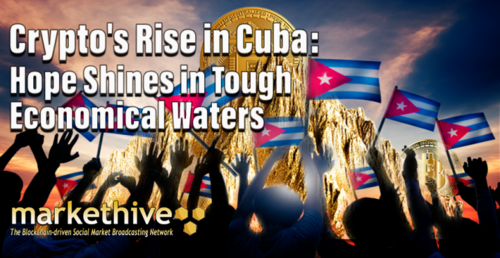
Cryptocurrency's Rise in Cuba: Hope Shines in Tough Economical Waters
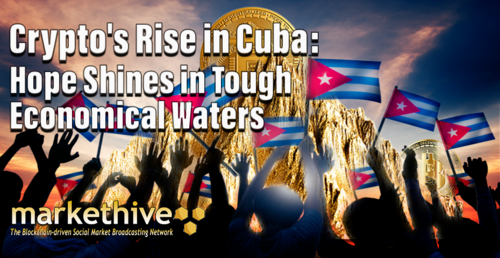
For many years, Cuba has faced serious economic challenges that have deeply affected the daily lives of its people. These challenges include trade restrictions, shortages of basic goods, and a lack of foreign investment. However, amidst these difficulties, Bitcoin offers a glimmer of hope to Cubans.
Although Bitcoin is still relatively new in Cuba, it's slowly gaining popularity among the population. One significant reason for this is Cuba's unique dual currency system, which has made Bitcoin an appealing alternative to traditional financial systems. Additionally, more Cubans are turning to Bitcoin to receive remittances from family members living abroad, further solidifying its role in their daily lives.
The increasing use of Bitcoin has sparked optimism that it could help revitalize Cuba's economy and empower its people. This digital currency holds the potential to bring about economic resilience and financial independence for Cubans. In this article, we'll explore the growing adoption of Bitcoin in Cuba and its potential to shape a brighter economic future for the nation. Join us as we uncover how a digital currency is influencing the destiny of an island nation in pursuit of better economic prospects.
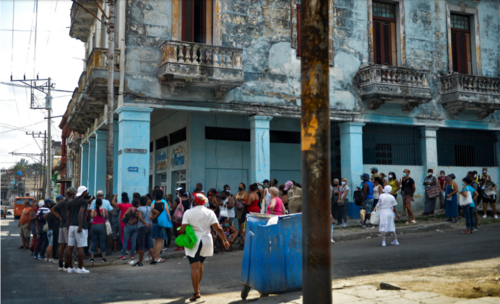
Image source: Dialogo Americas
The Evolution of Cuba’s Economy
Cuba currently faces one of its most severe economic crises since the early 1990s, a period characterized by the collapse of the Soviet Union, which had been the primary source of support for the island nation. During this era, Fidel Castro, the enduring dictator, called upon citizens to unite and endure what he termed a "special period." It was marked by food shortages, frequent blackouts, a significant exodus of Cubans to Florida on perilous rafts, and a devastating devaluation of the Cuban peso, pegged to the Soviet ruble. Between 1991 and 1994, Cuba's economy contracted by a staggering 35%, resulting in a substantial decline in the people's quality of life.
The summer of 1994 witnessed the Maleconazo uprising, a notable anti-government protest in Havana fueled by the failure of the state's ration system, which depended heavily on Soviet support. Essential goods suddenly became accessible only through the use of dollars, a currency increasingly elusive for Cubans with peso-based incomes. In a desperate bid to sustain its faltering economy, the regime abandoned its collectivist principles and imposed unprecedented taxes on the population. In response, tens of thousands of protestors converged along the Malecon waterfront, demanding an end to the government's rule.
During this period, the internet was non-existent, allowing the regime to suppress the movement through brutal police tactics, ensuring that most Cubans remained unaware of the scale of the protests. State-controlled media dismissed the events as a small gathering of delinquents and troublemakers. In reality, the Maleconazo represented a significant display of dissent, the most substantial since the Cuban Revolution in 1959.
Fast forward to today, and Cubans are again referring to a new "Special Period." This time, it is driven by currency reforms and decades of frustration stemming from political repression and bureaucracy. Shortages, frequent power outages, rampant inflation, and widespread protests mark the outcome. The key difference today is the presence of mobile phones and internet access, which keeps the world informed about the situation. On July 11, 2023, Cuba experienced its largest anti-government protest since 1959 in Havana and across cities nationwide.
Cuba, with its scorching climate, grapples with daily electricity shortages. Essential food items like beef, fish, chicken, and eggs are scarce or unobtainable. Obtaining necessities such as food, medicine, and sanitation supplies has become a daily challenge. The power grid is in disarray, and the healthcare system is on the brink of collapse. Oxygen and fans are in short supply, and an increasing number of elderly citizens are losing their lives. At the heart of the government's failures and the unprecedented uprising of its citizens lies a financial crisis.
In January, the Communist Party of Cuba initiated a "monetary purification" process. Since 1994, the government has been issuing two types of currencies: the CUP (Cuban peso), pegged to the dollar at a rate of 24:1, and the CUC (Cuban convertible peso), pegged at 1:1 to the dollar.
While public sector salaries and pensions were paid in pesos, citizens needed CUCs to purchase essential items such as medicine, non-basic foods, clothing, cleaning supplies, and electronics. The regime designed this system to drain value from the population by selling CUCs for 25 pesos at state-run money exchanges (cadecas) while repurchasing them at 24 pesos.
The government understood that it had to continually print and inflate pesos to sustain its centrally planned economy, even as the agricultural and industrial sectors collapsed. This dual-currency system maintained the purchasing power of the elite and well-connected while creating an economic disparity.
This system created a stark contrast where state employees, including teachers, police officers, and healthcare workers, were at a severe economic disadvantage compared to those involved in the tourist industry, such as waitstaff and taxi drivers.
As of January 1, 2021, the CUC was officially phased out, and Cubans were given six months to exchange their CUCs for pesos at the official exchange rate. This transition effectively robbed Cubans of their hard-earned CUCs, as they were forced to exchange them for rapidly depreciating pesos. Even before January, CUCs traded at a 15% discount to the dollar.
The government extended the window for Cubans to redeem CUCs for a few additional months. Still, usage has dwindled, replaced primarily by the MLC (moneda libremente convertible, or "freely convertible currency"). Introduced by the regime in 2019 as the future monetary system of the island, the MLC operates like a reusable gift card. A plastic MLC card is available at banks, along with two mobile apps for transactions. However, MLC lacks banknotes, coins, or interest-earning capabilities. Its functionality primarily revolves around Cubans receiving hard currency from contacts abroad, which the regime confiscates, replacing it with MLC credit for citizens to spend at government-run stores.
In a cruel irony, Cubans, who are predominantly paid or pensioned in pesos, cannot purchase MLC with their own currency. To officially top up their MLC accounts, they must use foreign hard currency, often sent by family or contacts abroad. Initially, this could be done with dollars, but due to the Trump administration's crackdown on remittances to Cuba, MLC is now mainly acquired through pounds, euros, and Canadian dollars.
Building upon a trend that began 25 years ago when better goods were only available in dollar stores, today's MLC stores are essentially the sole source of quality food, medicine, cleaning supplies, appliances, and other essentials. Peso stores regularly face shortages and offer limited and low-quality products. Cubans with family abroad can obtain MLC top-ups and purchase necessities to sustain their lives. In contrast, those without such connections must resort to the black market to acquire MLC, where the exchange rate is approximately 65 pesos for one MLC.
The Cuban regime effectively prints pesos through the MLC system to acquire hard currency. It's a massive deception perpetrated on the Cuban population and a major driving force behind the historic protests we witness in Cuba.
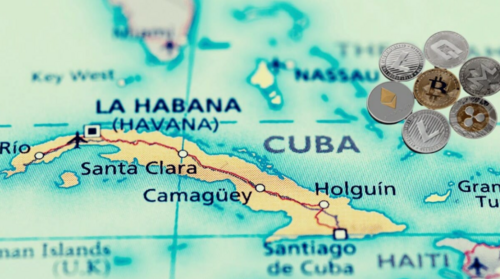
Image source: Crypto News
Finding Freedom Through Bitcoin
Bitcoin, a symbol of freedom and a reminder of American liberty, traces its origins back to the American Revolution. It was born out of a desire to break free from Britain's control of war and monarchy.
Now, let's jump to 2023, where a new kind of tyranny is on the horizon in every part of the world. Bitcoin offers us an opportunity to escape the control of central bankers, a chance to choose a different path. Its popularity is growing to the point where these financial authorities can no longer maintain their grip. This isn't just about changing our monetary system; it's about reclaiming control, securing financial freedom, and building generational wealth.
Cuba has a history of rebels and resilient spirits. Brave individuals who resisted the iron grip of the Castro regime are now at the forefront of a different kind of revolution—Bitcoin. In the past, talking about Bitcoin in Cuba had to be done secretly. Today, it's open, a topic of discussion, and offers hope through the Lightning Network.
In a country where the once-powerful peso has become nearly worthless, Bitcoin provides a lifeline. The average salary in Cuba is barely enough to survive on. When the cost of coffee beans for your morning espresso exceeds a Cuban's monthly wage, something is seriously wrong. Bitcoin offers a way out, a path to a better future.
Bitcoin transactions in Cuba occur through Telegram groups and the Lightning Network. They're nearly feeless and shrouded in secrecy to avoid government scrutiny. Traditional institutions have failed the Cuban people, but they've found new hope in Bitcoin. It's a way to preserve their energy, wealth, and hard-earned money over time.
For many Cuban businesses struggling to pay foreign suppliers, Bitcoin is the solution. It's a lifeline for acquiring essential goods that Cuban pesos or MLCs cannot buy. Bitcoin's presence is everywhere, from the heart of Havana to the bustling streets of Santiago. It's a revolution, a declaration, and a defiant response to a history of tyranny, oppression, hyperinflation, and despair.
Historical revolutions were led by visionaries but driven by the courageous. In modern-day Cuba, that courage is reflected in satoshis stored in Bitcoin wallets—a dream of an unburdened and unrestrained Cuba. Cuba is embracing Bitcoin wholeheartedly, educating its people, and making it a part of their future. They understand that in the long run, Bitcoin will remain while the Cuban peso may not.
The Cuban Bitcoin community is growing, and Bitcoin is their symbol of hope. They don't worry about market ups and downs; they worry about the survival of the Cuban peso. Bitcoin is their lifeline and their path to financial freedom. In this quest for freedom and defiance, we salute the rebels, the dreamers, and the trailblazers. The Bitcoin Revolution is here, and it won't wait for anyone. Join in or step aside.
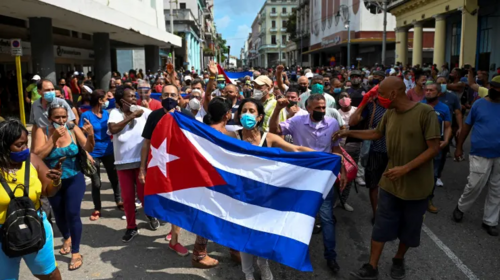
Image source: CNBC
A New Era Dawns in Cuba
Much like other closed regimes such as North Korea and the Soviet Union, Cuba is experiencing a profound transformation thanks to technology and access to outside information. The nationwide protest movement on July 11 wouldn't have been possible without the digital tools that enable people to organize and connect.
In Cuba, the internet is dismantling the consensus held by the ruling elites, who rely on controlling information. If the internet continues to thrive in Cuba, it could eventually lead to the fall of the Cuban government. However, despite nearly two decades of economic reforms and half a decade of an increasingly connected population, the Cuban communist party maintains its grip on power.
The government's resistance to change and its conservative nature have helped it endure for decades. While Bitcoin offers a way for the government to accumulate the world's hardest currency, those in charge may not consider it a risk worth taking. On the U.S. front, the Biden administration is reviewing remittances to Cuba to find ways for people in the U.S. to send money to their families on the island without supporting the regime.
During the recent turbulent weeks, one thing has become evident: a growing number of Cubans are no longer willing to wait for their government to implement reforms or for the Biden administration to ease sanctions. They are taking control of their financial destinies through Bitcoin.
While the current political protests may demonstrate that Cubans are weary of dictatorship, they might not be enough to bring down the regime. Many have predicted the fall of the Castro regime over the decades, only to be proven wrong. In the meantime, Cubans will continue their peaceful protest by opting out of the exploitative peso and MLC systems and embracing Bitcoin. After six decades of economic hardship, they have finally found a way out. Bitcoin has become a quintessential Cuban movement and a solution that appears unlikely to be halted.
Conclusion
As Cuba grapples with a severe economic crisis and restricted access to traditional financial systems, the emergence of Bitcoin provides a beacon of hope for the nation's future prosperity. Adopting this decentralized cryptocurrency opens up a world of possibilities for Cubans to explore alternative monetary solutions and seize control of their financial destinies.
In a landscape marked by trade embargoes, commodity shortages, and limited foreign investment, Bitcoin represents a lifeline to economic resilience. Its borderless nature transcends the constraints of traditional banking, offering Cubans a pathway to financial empowerment. By embracing Bitcoin, they can break free from the shackles of economic instability that have persisted for decades.
However, the journey toward widespread Bitcoin adoption in Cuba has its challenges. Limited internet access poses a significant hurdle, hindering the ability of many Cubans to fully participate in the digital economy. Regulatory ambiguity also looms as a potential impediment.
Yet, the potential benefits for the Cuban people are nothing short of transformational. Bitcoin empowers individuals to take control of their wealth and participate in the global economy on their own terms. It represents an opportunity for financial inclusion, economic self-determination, and the pursuit of brighter economic horizons.
As we witness the early stages of Bitcoin's journey within Cuba, it's clear that this digital currency has the power to reshape the nation's economic destiny. It offers a glimmer of hope amid adversity, a lifeline for those seeking financial stability, and a symbol of resilience for a country with a rich history of overcoming challenges.
In closing, let us remain hopeful and watchful as Cuba navigates this transformative path. With each Bitcoin transaction and each step towards financial independence, the Cuban people inch closer to a future where economic prosperity knows no bounds.

Bruce Jacobs


.png)